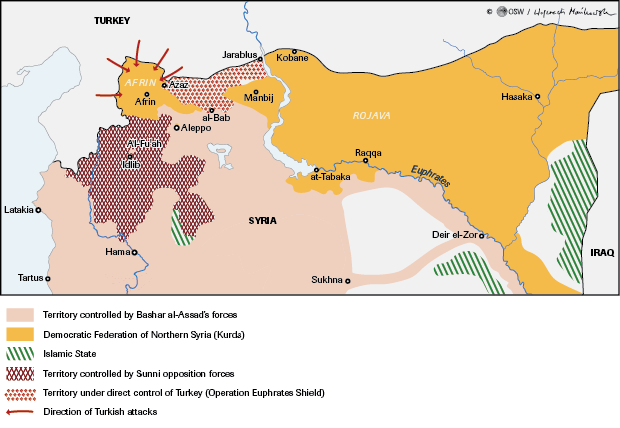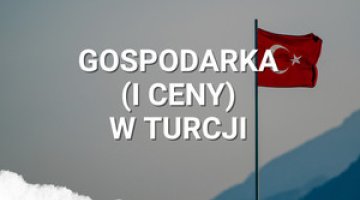The Turkish military operation in Afrin, northern Syria
On 20 January, Turkey launched Operation Olive Branch, aimed at the Afrin region in northern Syria, which is ruled by Syrian Kurds of the Democratic Union Party (PYD). This action includes the participation of armed fighters from the Sunni opposition, loyal to Ankara, who are being supported by Turkish tanks and aircraft. Turkey’s actions were preceded by regular shelling of Kurdish positions over the past week. Turkish forces entered into Afrin after an agreement with Russia and the withdrawal of Russian army units from this area, as well as the Kremlin’s agreement to keep the airspace open for Turkish aircraft. The Turkish government has announced that the aim of the operation is to create a zone by the Syrian-Turkish border area, controlled by Turkey, on territory occupied by the Syrian Kurds, to prevent the latter’s penetration into Turkey. In response to the Turkish operation, the European Union expressed its concern about the situation of civilians on the ground and the potential for a new humanitarian crisis (President Recep Tayyip Erdoğan has spoken by telephone to the French President Emmanuel Macron). The operation was also the subject of an extraordinary session of the UN Security Council, although it has not made any formal statement on the matter.
Commentary
- The operation in Afrin is a response to an offensive by Bashar al-Assad’s troops aimed at the Sunni rebels loyal to Ankara located on the territory of the so-called de-escalation zone, which was agreed with Russia and Iran in the province of Idlib, and for which Turkey has taken responsibility. This offensive significantly weakened Ankara’s position in Syria. The Afrin region, which is made up of two cantons (Afrin and Shahba), is an exclave of the Democratic Federation of Northern Syria (also known as Rojava). This is a Kurdish para-state, created with the participation of the local Arab population, which is ruled by the Democratic Union Party (PYD); Turkey sees this group as the Syrian wing of the Kurdistan Workers’ Party (PKK), which is considered as a terrorist organisation by not only Turkey, but also by the US and the EU. The US has supported the PYD as an ally in the fight against the Islamic State and has trained its fighters in northern Syria, although there are no US forces in Afrin (Russian units had in fact previously been stationed there). Both the actions by the Syrian regime in Idlib and the American presence in Rojava seriously undermined Turkey’s position. In this situation, Ankara decided to conduct an operation aimed at weakening the position of the Syrian Kurds in those territories where they do not have American support. The aim is to both secure the southern border of Turkey in this region, and to make use of the Ankara-backed Sunni opposition (which, in the absence of Turkish support, could endanger Turkey itself).
- On the international level, the Turkish attack on Afrin should be read as a tough act of resistance to American policy and Washington’s persistent attempts to aid the PYD. It came in response to the US announcement of the creation of a body of Kurdish border defence forces numbering around 30,000 officials. Ankara sees this as the de facto creation of a regular army for the para-state, which it considers to be a serious threat to Turkey’s safety. For the time being, the operation in Afrin has met with moderate reactions from the Americans. The US State Department has expressed understanding for Turkey’s need to defend its own borders; the Secretary of State Rex Tillerson has even suggested the possibility of cooperation in this area between Washington and Ankara. At the same time, the Pentagon’s spokesman has stressed that the United States supports the PYD solely as a force which fights the Islamic State, and not as a political project which could threaten Turkey. The American government appears to have been surprised not only by the swift and strong reaction from Turkey, but also by the agreement with Moscow which allowed Ankara to start the operation.
- The Turkish-Russian agreement covers both Syria and the Syrian Kurds, as well as issues of energy supply. For its part, Russia has withdrawn its troops from Afrin and given permission for Turkish air forces to operate over the region, and has also agreed to exclude the Kurdish PYD party from the Congress of Syrian National Dialogue scheduled for late January in Sochi. Turkey in turn has withdrawn its objections to the Congress, and has probably guaranteed that the Syrian opposition groups which it sponsors will participate. Russia’s aim for the Congress is to engineer a political agreement between the Assad regime and a part of the Syrian armed opposition; thus building on the military advantage Assad has achieved in the civil war and legitimising the role of Russia as a key player in Syria. Another great strategic benefit for Russia is the deepening tension between Ankara and Washington. Russia’s tacit approval of the Turkish operation in Afrin coincided with Turkey’s granting (19 January) of the long-awaited official permit for Gazprom to construct a second branch of the Turkish Stream gas pipeline in Turkey’s economic zone of the Black Sea. The conclusion of this agreement is of great strategic importance for Russia because it will provide yet another export route for Russian gas to European markets as an alternative to transit via Ukraine.
- Ankara has shown great determination in its efforts to secure the southern border of the country, offset the threat from the PYD, and channel the activity of the Syrian Sunni opposition. President Erdoğan has declared that the present actions are a prelude to a similar operation against the Kurdish-occupied Manbij region, where American forces are stationed. Turkey is adopting an ever harsher position towards the USA with regard to the PYD, while deepening its dependence on Russia in matters concerning Syria. However, the outcome of Operation Olive Branch is currently difficult to predict, and if it drags out, Turkey’s position in the Syrian conflict may actually be further weakened. The Kurdish forces in Afrin (which is actually a fortified area, located in a mountainous and forested area which can easily be defended) are estimated at around 10,000 fighters, who have good ideological motivation; both the Turkish forces and their allies have already seen their first losses in combat. For this reason, it is possible that Turkey will dispense with attempts to occupy the whole region (which may be considered their maximal plan) and limit itself to occupying a frontier strip with a width of about 30 km (the minimal plan).
- Operation Olive Branch risks of deepening the war-induced humanitarian crisis even further. Afrin is an agricultural/industrial region, whose economy has so far remained largely untouched by the war. For this reason it has become attractive to refugees from other regions of Syria, who make up more than half of the region’s current population, estimated at present at between 500,000 and 800,000. The fighting has already caused considerable destruction, casualties among the civilian population, and the departure of the first 5000 refugees. It is highly likely that further fighting will lead to another wave of refugees from the region.
Mateusz Chudziak, Mariusz Marszewski
Cooperation: Witold Rodkiewicz
Map. The situation in northern Syria.






